Yukon Gold Potatoes Vs Russet: A Difference In Flavor And Texture
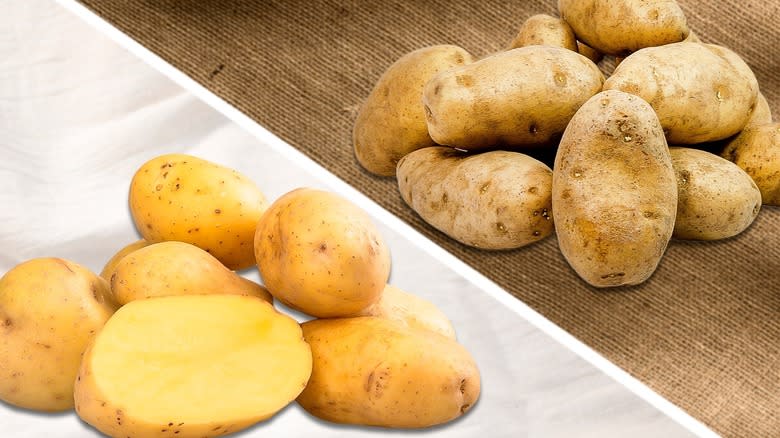
You may walk through the grocery store thinking any potato is just a potato, but when you actually get into the hard work of cooking you'll quickly realize that's not exactly true. There are a lot of different types of potatoes, over 4,000 around the world, and that diversity produces a stunning range of textures and tastes. For the purposes of your average home cook in the U.S., you only need to understand a few, yet even those few have some meaningful differences. The produce section of your grocery store will likely stock red potatoes and white, as well as the big two that see the most uses: russet and Yukon Gold.
Potatoes have various characteristics, but the one comparison most commonly used to classify them is starchy versus waxy. Generally, starchy potatoes are drier and lighter, while waxy varieties are denser and more solid when cooked. Russet potatoes are the quintessential starchy potato, while Yukon Golds fall more in the middle of the range. Both work great in a wide variety of preparations, like mashing and frying, but they will behave a bit differently in recipes. Your choice will mostly come down to personal preference for the stronger structure and taste of Yukons, or the flavor-absorbing blank slate of russets — and you can't go wrong with either most of the time.
Read more: 15 Best Knife Brands, Ranked
What Are Russet Potatoes?
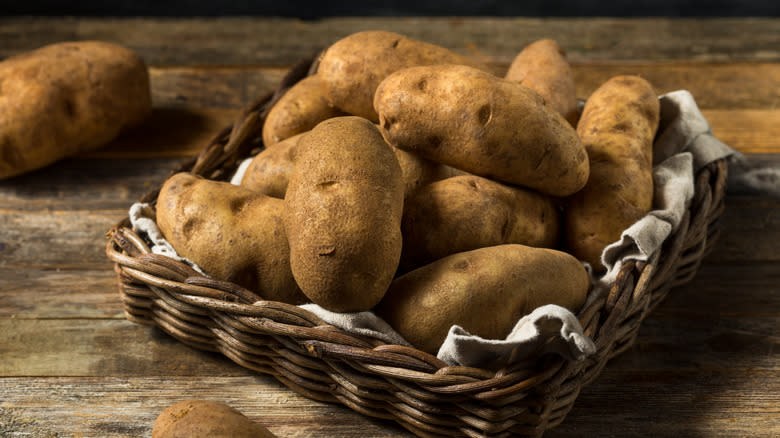
Russets are your classic brown skinned oblong potatoes, which are also known as Idaho potatoes since they're most often grown there. They're called russets because of their characteristic "russeted" skin, and they are by far the most popular variety of potato in the U.S. This is mostly due to their use in making french fries, which is why russets make up about 70% of the country's potato consumption.
The russet is a hybrid cultivar that dates back to the 1870s; there are actually different varieties of russet-type potatoes, but the one we're all most familiar with is called the Burbank, after its breeder Luther Burbank. He created his version to be resistant to the potato blight, which had recently caused the Irish potato famine.
True to its reputation, the russet is a high-starch, low-moisture potato. When cooked, it develops a fluffy, dry interior and crispy skin, which create a nice textural contrast. Its light structure breaks down quickly and easily when cooked, which is welcome when you want potato dishes with an airy, less rich flavor and texture. Overall, russets are considered highly versatile, all-purpose potatoes. However, because of their soft consistency and lack of moisture, they don't work as well in wet recipes like soup, where they have a tendency to break down or disintegrate if cooked too long.
What Are Yukon Gold Potatoes?
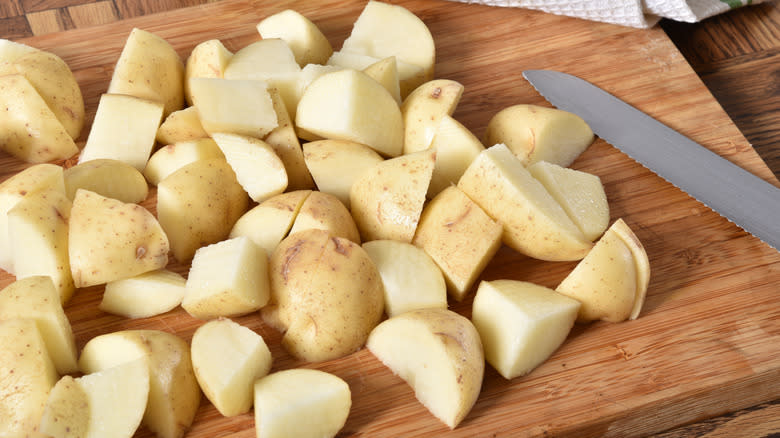
Yukon Golds are medium-sized potatoes with characteristic yellow skin and flesh. They are a more recent breed developed in Canada in the 1960s, and they take their name from the Yukon River. They didn't become available in the U.S. until 1980; at the time white flesh potatoes were still considered the norm, despite gold potatoes having had a long history in Europe and South America. As a cross between a white potato and a wild South American yellow breed, they were the first Canadian potato to be developed and sold by name, and have since gone on to massive popularity.
The skin of a Yukon Gold is thin, while the flesh falls right in the middle zone between waxy and starchy. These potatoes are considered to have the best of both worlds, being both soft when cooked and able to hold their shape; so like russets, Yukon Golds are considered all-purpose potatoes. When it comes to roasting potatoes, Yukon Golds' ability to stay creamy on the inside but get crispy on the outside, and deliver more flavor makes them ideal. Although Yukon Golds are the most ubiquitous gold potatoes found in the U.S., there are other gold varieties that have similar characteristics and are interchangeable in recipes.
Russet Potatoes Are Fluffy With A Mild Taste
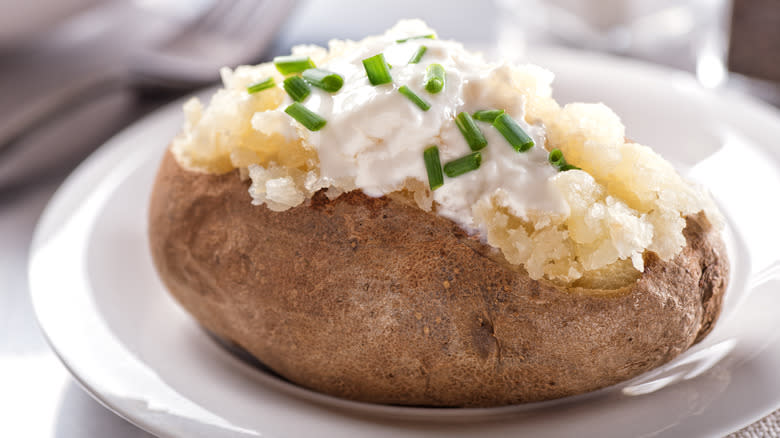
The most common term used to describe the taste of a russet is mild, and while that may seem like a downside, it can easily be turned into a strength. In fact, the best way to describe the flavor may just be "potato," as russets embody what is most people's ideal of the tubers' earthy taste. The soft notes don't mean they are flavorless, but they work best when you want other ingredients to be the star. Russet potatoes' light, airy texture also means they quickly and easily absorb flavors, whether it's the butter of a baked potato, or garlic and cream when mashed.
Yukon Golds have a more pronounced flavor. They are rich and buttery on their own, and stand out better when you want your potatoes to lend more of the taste to a recipe. With thinner, less obtrusive skin, they don't have the same peaty, rustic notes you get from russets. Instead, they lean more creamy and luxurious, which is great for refined dishes like pommes puree. Yukon Golds can even be more complex, with more vegetal notes and some sweetness. This means they need less seasoning and additions than russets, but also don't take on other flavors as readily.
Yukon Gold Potatoes Are A Middle Ground Between Waxy And Starchy
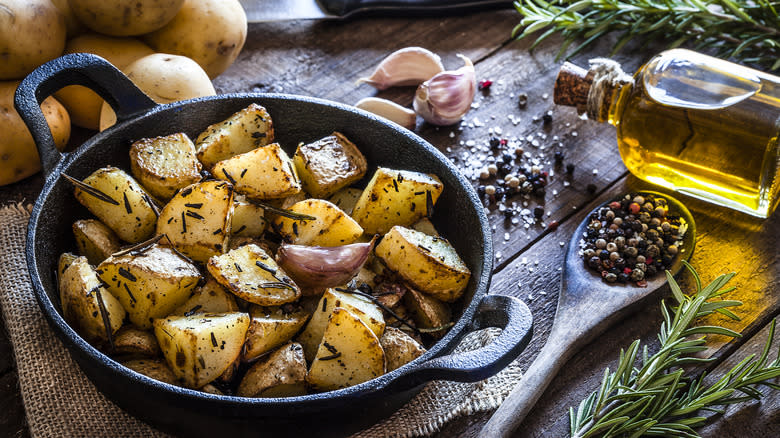
While the flavor of a Yukon Gold stands out more, the texture of this variety is what makes them so versatile. Depending on how you treat them, they will hold their shape and stay firm, or start to break down if you cook them long enough. However you cook them, they also have a smooth consistency compared to the sometimes grainy feel of russets. Yukon Golds are more moist than starchy potatoes, which gives them that luxurious, melt-in-your-mouth texture, but they still have enough starch to brown well and crisp up.
The russet's fluffy texture on the other hand can be both an asset and a downside. The lack of moisture means it's easier for them to dry out and turn mealy. But that same quality also contributes a lightness that means russets are easy to work and smash, and that translates to the best mashed potatoes that are airy instead of gummy. Dumplings or pasta made with them will be nice and tender as well. Less water also means russet potatoes will get even crispier than Yukon Golds when cooked. (There is a reason they are so popular for fries.) And while russets' starchy interior will easily break down and won't hold its shape well in liquids, that can be an advantage sometimes too, as they can melt into soups and stews and be used as a thickening agent.
Russet Potatoes Are Richer In Nutrients
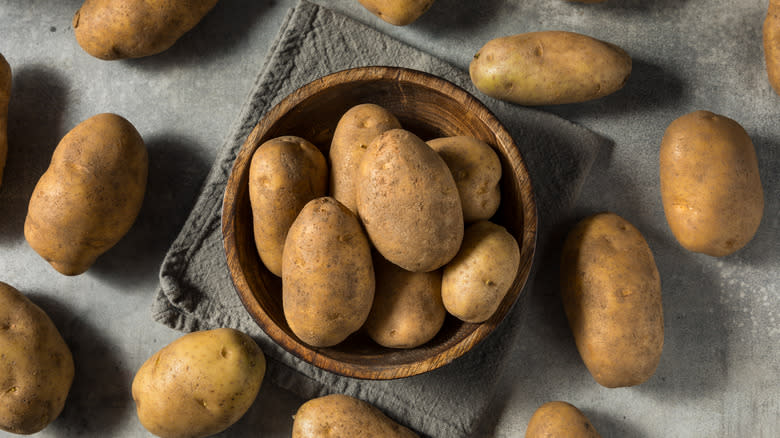
Potatoes in general have gotten an unfairly bad wrap when it comes to healthy eating. Sometimes dismissed as nothing but starchy calories, they actually aren't that high in carbohydrates, with an average potato containing only 12% of the daily recommended carb intake. Potatoes are very low in fat and sodium, and free of gluten and cholesterol as well, helping them fit in with a variety of diets. Potatoes are also quite nutritious, containing a wide variety of minerals like potassium, and high levels of vitamin C.
While both Yukon Gold and russet potatoes have these benefits, the latter does have somewhat higher levels of nutrition. Russets have about 50% more fiber than an equivalent serving of Yukon Golds, and about 25% more protein. They are also higher in potassium, magnesium, and iron, and have more than double the amount of vitamin B6, which is important for immune system health.
The one spot where Yukon Golds will serve you better is vitamin C, as they offer more than twice as much as russets. They're also somewhat lower in calories and carbs by weight, having about 20% less of both for the same serving size. No matter which potato you chose, they both deliver nutritional benefits.
Yukon Gold Potatoes Are Ideal For Roasting And Mashing
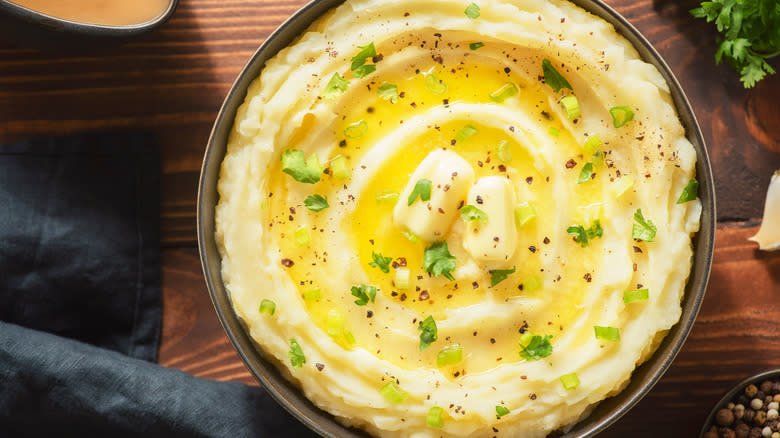
Both Yukon Golds and russets are all-purpose potatoes with good reason, but stacked up against one another, they both have certain preparations where they each shine a little more. While russets mash well, Yukon Golds' more buttery flavor and creamy texture often make them the best choice for mashing over any potato. They are also great in soups and stews where they will hold their shape but still get nice and soft compared to waxier potatoes like reds. Really, any recipe that heavily features potatoes is going to be great with Yukon Golds. Sauteed dishes like Lyonnaise potatoes benefit from their robust flavor and balanced texture, and the same goes for casseroles like potatoes au gratin.
Russets have one clear advantage over Yukon Golds and that is any recipe that involves frying. They crisp up better than just about any potato, making them the top choice not just for fries, but for hash browns or latkes. While Yukon Golds are generally better for roasting, russets are still a good option if you prefer a lighter interior instead of a creamy one. Russets are also potato number one when it comes to baking, with their more robust skin forming a nice crust, and their fluffy texture serving as a great vehicle for all kinds of mix-ins. And while you usually want to avoid russets in wetter dishes, their starchy nature makes them great for creamy potato soup.
Read the original article on Tasting Table.

